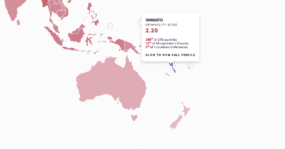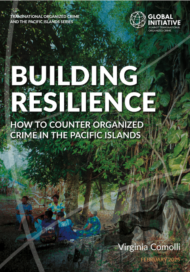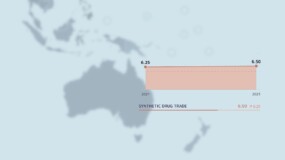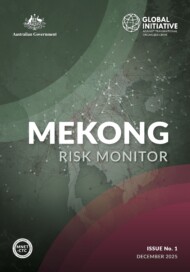Posted on 26 Nov 2024
The Global Organized Crime Index (henceforth, ‘the Index’), which tracks criminality and resilience trends, underscores the importance of regional and national resilience to organized criminal actors and their underworld activities Although the Index only covers UN member states, globally there are unique legal entities and disputed territories that continue to be impacted by criminal activities. Just because a country is not part of the Index does not mean that it is immune from transnational organized crime. The Pacific Islands region has a vast array of political and constitutional statuses, which means that many states and territories are not captured adequately by the Index.
Local communities and governance structures have an integral role to play in combating transnational organized crime, even in countries that have security or constitutional arrangements with another country. In 1965, the Cook Islands regained independence but has remained in free association with New Zealand, which retains responsibility for defence through a ‘flexible sovereignty’ arrangement. The Cook Islands self-governs, manages its own territorial borders and foreign affairs, and is a member of several international organizations such as the International Monetary Fund and the International Labour Organization. However, just because the Cook Islands is not yet officially a UN member state (and, therefore, not included in the Index) does not mean that it is not affected by transnational organized crime.
In the 2023 Index, Oceania scored 5.55 out of 10 for resilience, which includes government efforts, civil society involvement, media freedom and community resilience. Of the 12 resilience measures assessed by the Index, the region had the highest average score (6.39) for ‘national policies and laws’. If the Cook Islands were included in the Index, it would score highly for resilience, as it was the second Pacific state to ratify the UN Convention against Transnational Organized Crime and has a 2024 National Security Policy that states a transnational organized crime strategy for the country will be developed.
According to the Index, Oceania has a stronger score for resilience to organized crime than for criminality. Yet despite the region’s low criminality score, which is 3.23 out of 10, some types of organized criminal activity remain prevalent in the region. For example, fauna crimes are widespread, scoring 5.25 out of 10 in the Index, mostly relating to illegal, unregulated and unreported (IUU) fishing. Wildlife trafficking and the unregulated trade in wildlife are also of concern within the Cook Islands’ large exclusive economic zone (EEZ), resulting in the decline of many species of animals and plants, including marine mammals, corals and clams.
However, although not currently a member of the Convention on International Trade in Endangered Species of Wild Fauna and Flora (CITES), the Cook Islands has increased its resilience through following CITES processes by issuing fines to those taking wildlife overseas without CITES permits. In addition, the country has a National Plan of Action to prevent, deter and eliminate IUU fishing, and was gifted a patrol boat by Australia to monitor its EEZ. International partners assist with regular patrols detecting IUU breaches, and the Cook Islands and the US have a shiprider agreement that allows maritime law enforcement officers to search vessels suspected of violating regulations.
Another area of concern is that the Cook Islands has issued licences for undersea exploration of critical minerals, including cobalt and nickel. This could result in the Cook Islands being the first country in the world to pursue undersea exploitation within its own EEZ and could have potentially major environmental consequences.
In addition to fauna crimes, the Pacific is also a transit and – increasingly – a destination region for the illicit drug trade. Between 2021 and 2023, Oceania’s criminality score for the synthetic drug trade increased from 3.57 to 3.86. Illicit drugs are easily trans-shipped across vast ocean areas and through uninhabited islands, out of sight of border control agencies. The Cook Islands is particularly vulnerable, with 15 islands (some with small populations or uninhabited) spread over 2.2 million square kilometres. The country has received boats rumoured to carry drugs on its shores from South America and in 2024 law enforcement agencies prosecuted the first case of illegal importation of cocaine to the Cook Islands hidden in protein powder. There is also some local cannabis and methamphetamine consumption, particularly in Rarotonga, the largest of the islands.
The risk of drug-related crimes is increased by the movements of organized criminal gang members in the region. During the late 2010s, the Cook Islands was the most visited gang hotspot in the Pacific. In response, the country’s Ministry of Foreign Affairs and Immigration (MFAI) amended legislation to prevent people with criminal convictions from boarding a plane to the Cook Islands, and implemented an endorsement stamp in passports, so only people with Cook Islands heritage had unrestricted entry. This move, which the MFAI said was intended to ‘refuse entry to known gang affiliates, ex-cons and others who are considered a threat to the safety and security of the Cook Islands’, dramatically reduced the movement of gang members to the country.
In one case, a senior member of the New Zealand-based Head Hunters gang resided in the Cook Islands for some time, but the Cook Islands national was not welcomed by the community and eventually left for New Zealand, despite retaining property on Rarotonga. This is one example of the Cook Islands’ community resilience to organized crime, which helps to prevent gang activity. As one interviewee for a 2024 study explained, ‘if we see them [gang members] with their patch on, then we won’t let them in the club […] it’s just the locals, they hate seeing patched members, everything to do with the gang, they hate it’.
Other countries deporting criminals to island shores has become a significant political issue noted in the Pacific Islands Forum’s Regional Transnational Organised Crime Disruption Strategy. Of concern is the impact of criminal deportations on transnational crime due to the risk that, in the absence of reintegration programmes and job opportunities, criminal returnees might become involved in organized criminal activities. All deportations to the Cook Islands originate from Australia. Although people deported to the Cook Islands have re-offended, with crimes including arson and assault, none have been prosecuted for high-level transnational criminal activities. Expanded mental health support is needed to assist deported people reintegrate in the Cook Islands, which would bolster resilience.
Due to the nature of the region and its security architecture, Oceania’s score for international cooperation is high, at 6.21 under the Index. In addition, if included in the Index, the Cook Islands would add to Oceania’s high law enforcement score of 5.96. The country is an active member of the regional law enforcement community, participating in a range of organizations, including the Pacific Islands Chiefs of Police and the Oceania Customs Organisation, among others. Local law enforcement agencies also work closely with international security and development partners, including New Zealand and Australia, to build law enforcement capacity, particularly related to intelligence and border control.
However, transnational organized crime permeates all borders. If the Global Organized Crime Index included non-UN members, the Cook Islands would have a high score for resilience but would not be immune from the international impact of transnational criminal activities that affect the Pacific region. The case of the Cook Islands is just one example of how transnational organized crime knows no bounds, suggesting the need to carry out analysis of illicit flows regardless of the UN membership status of the affected countries.
This analysis is part of the GI-TOC’s series of articles delving into the results of the Global Organized Crime Index. The series explores the Index’s findings and their effects on policymaking, anti-organized crime measures and analyses from a thematic or regional perspective.



